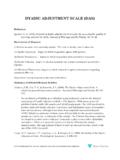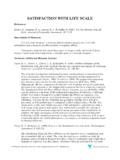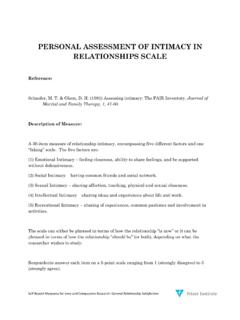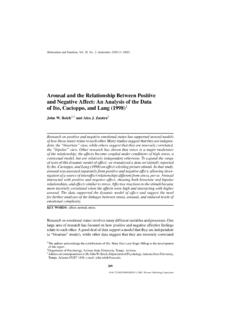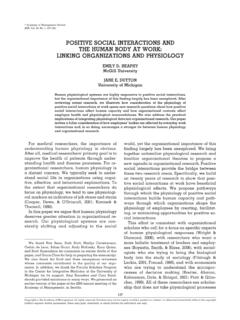Transcription of BRADBURN SCALE OF PSYCHOLOGIC WELL- BEING (also …
1 Self Report Measures for Love and Compassion Research: Satisfaction BRADBURN SCALE OF PSYCHOLOGIC well - BEING ( also known as the affect Balance SCALE ) Reference: BRADBURN (1969). The structure of psychological well - BEING . Chicago: Aldine. Description of Measure: The SCALE is made up of two components: the positive affect and the negative affect component. Each component has 5 items. The SCALE asks participants if, in the past few weeks, they have felt certain emotions. The participant answers Yes or No to each question. The No score is subtracted from the Yes score to create a positive / negative affect difference score.
2 Abstracts of Selected Related Articles: McDowell, I. & Praught, E. (1982). On the measurement of happiness: An examination of the BRADBURN SCALE in the Canada Health Survey . American Journal of Epidemiology, 116, 949-958. Certain characteristics of the BRADBURN SCALE of PSYCHOLOGIC well - BEING which have been criticized in recent discussions are re-examined using data from the 1978-1979 national Canada Health Survey. This large data set (N = 17,279) enabled the authors to examine the questions In a representative sample of the noninstltutionallzed population. Reference standards are derived showing response frequencies by age and sex.
3 In addition, the validity of the theoretic foundation of the SCALE is examined. The conclusions suggest that the items measure two dimensions of affect and are appilcable In at least two different cultural groups. However, under certain circumstances the affect balance score does not provide the most adequate summary of the data, and the notion of independence between positive and negative affect does not hold for all of the questions. The authors conclude that two of the questions In particular appear weak, but that the design of the SCALE as a whole shows advantages over alternative Instruments as an Indicator of emotional wellbeing in general population surveys.
4 They advocate that the SCALE continue to be used until a more adequate set of questions can be developed. Ryff, C. D. (1989). Happiness is everything, or is it? Explorations on the meaning of psychological well - BEING . Journal of Personality and Social Psychology, 57, 1069-1081. Reigning measures of psychological well - BEING have little theoretical grounding, despite an extensive literature on the contours of positive functioning. Aspects of well - BEING derived from this literature ( , self-acceptance, positive relations with others, autonomy, environmental mastery, purpose in life, and personal growth) were operationalized.
5 Three hundred and twenty-one men and women, divided among young, middle-aged, and older adults, rated themselves on these measures along with six instruments prominent in earlier studies ( , affect balance, life Self Report Measures for Love and Compassion Research: Satisfaction satisfaction, self-esteem, morale, locus of control, depression). Results revealed that positive relations with others, autonomy, purpose in life, and personal growth were not strongly tied to prior assessment indexes, thereby supporting the claim that key aspects of positive functioning have not been represented in the empirical arena. Furthermore, age profiles revealed a more differentiated pattern of well - BEING than is evident in prior research.
6 Folkman, S. (1997). positive psychological states and coping with severe stress. Social Science and Medicine, 45, 1207-1221. Providing care to a spouse or partner who is dying and then losing that person are among the most stressful of human experiences. A longitudinal study of the caregiving partners of men with AIDS showed that in addition to intense negative psychological states, these men also experienced positive psychological states throughout caregiving and bereavement. The co-occurrence of positive and negative psychological states in the midst of enduring and profoundly stressful circumstances has important implications for our understanding of the coping process.
7 Coping theory has traditionally focused on the management of distress. This article describes coping processes that are associated with positive psychological states in the context of intense distress and discusses the theoretical implications of positive psychological states in the coping process. Self Report Measures for Love and Compassion Research: Satisfaction SCALE : Participants answer Yes or No to the following: positive affect questions: During the past few weeks (did you feel).. Did you feel particularly excited or interested in something? Proud because someone complimented you on something you had done? Pleased about having accomplished something?
8 On top of the world? That things were going your way? negative affect questions: During the past few weeks (did you feel).. Did you feel so restless that you couldn't sit long in a chair? Very lonely or remote from other people? Bored? Depressed or very unhappy? Upset because someone criticized you? Scoring: For positive affect , participants receive 1 point for every Yes they say. For negative affect , participants receive 1 point for every Yes they say. The overall balance score is created by subtracting the negative affect score from the positive affect score


